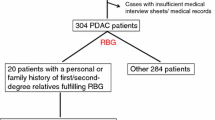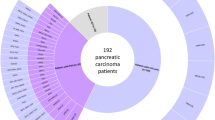Abstract
Germline DNA alterations affecting homologous recombination pathway genes have been associated with pancreatic cancer (PC) risk. BRCA2 is the most studied gene and affects the management of PC patients and their families. Even though recent reports have suggested a similar role of germline ATM pathogenic variants (PV) in familial PC, there is still a disagreement between experts on how it could affect patient management given the lack of proper PC risk estimates. We retrospectively analyzed the germline data of 257 PC patients among whom nearly 50% were sporadic cases. We showed similar frequencies of BRCA2 (4.9%) and ATM (4.4%) PV or likely pathogenic variants, which were not related to familial history. Based on our findings and that of the literature, we suggest including ATM gene among the panel of genes analyzed in PC patients pending the publication of prospective studies.
Similar content being viewed by others
Avoid common mistakes on your manuscript.
Short Report
Pancreatic cancer (PC) is the fourth leading cause of cancer death with a five-year survival rate less than 10% [1]. Nearly 1 in 10 patients diagnosed with PC has familial clustering of PC, but only 10% could be attributed to high penetrance germline DNA alterations affecting DNA repair, mainly the homologous recombination (HR) pathway genes [2]. BRCA2 account for most inherited mutations in hereditary PC with a frequency ranging between 5 and 15% depending on population selection [2]. Germline aberrations affecting BRCA2 were also identified in sporadic cases [3]. Interest in germline HR-gene alterations has grown significantly in recent years with the advent of the poly ADP ribose polymerase inhibitors (PARPi). Tumors harboring HR pathway defect are highly responsive to PARPi due to synthetic lethality. This concept has been proven in clinical trials and this class of drugs have been approved in the treatment of patients with advanced PC harboring germline BRCA1/2 (gBRCA) mutation [4]. In vitro studies have also shown that the concept of synthetic lethality related to PARPi is not limited to BRCA1/2 and could be seen in tumors harboring defects in other HR genes [5]. Thus, there is some utility, in both cancer screening and treatment, to identifying other germline susceptibility aberrations in patients with PC mainly among the genes implicated in the HR pathway (BRCA and non-BRCA).
We retrospectively analyzed the data of 257 pancreatic adenocarcinoma patients who were treated in our institution and were referred to a germline DNA testing between 2017 and 2020. Patients were referred for testing based on national guidelines taking into account personal and family history of neoplasia (for example: Lynch syndrome related cancers and HR-pathway-gene related cancers). Their mean age at diagnosis was 60 years old (SD = 12.8). Fifty eight percent were female and 50% had a history of at least one first-degree relative with PC.
Germline DNA was extracted from peripheral blood and tested using a panel of 45 genes including among others HR genes (ATM-BRCA1-BRCA2-PALB2-BARD1-BRIP1-CHEK2-NBN- RAD51B- RAD51C-RAD51D) and MMR genes (MLH1-MSH2-MSH6-PMS2). The list of genes included in the panel differed between patients depending on the guidelines that were being followed at the time of each analysis. Patients have signed informed consent for the genetic analysis. Variant interpretation was based on Gustave Roussy database (internal database), Clinvar information and ACMG criteria for classification.
In total, 13.2% of patients (34/257) harbored germline PV/LPV. 4.5% (11/245) had BRCA2 alterations followed by ATM 4.4% (11/252), TP53 2.56% (1/39), CDKN2A 1.27% (3/236), BRCA1 1.2% (3/242), PALB2 0.85% (2/234), MSH6 0.43% (1/231), and MLH1 0.43% (1/232). Six of the 11 patients harboring germline alteration in ATM had a known family history of PC.
Overall, the results of this cohort reproduced what have been published in the literature concerning the frequency of gBRCA and non-BRCA HR-gene mutations. Among the latter group, ATM is the most frequently affected gene. The frequency of gATM deleterious mutations ranged between 3 and 5% in familial PC patients [6, 7]. It should be noted that nearly half of gATM patients in our cohort were sporadic PC. In two very large studies, ATM PV have been shown to confer a risk of PC 4 to 6 times compared to the general population [8,9,10]. Despite these findings, the role of gATM alterations in the current management of PC patients and their families is not well established yet, and the inclusion of ATM among the genes to be analyzed in patients with a family history of PC is still unclear. Nevertheless, 88% of the experts participating in the last international cancer of the pancreas screening consortium (CAPS) agreed to test for gATM (weak grade of recommendation = probably do it), and to use endoscopic ultrasound and biliary MRI for annual surveillance of mutation carriers with one PC affected first-degree relative [11]. Future prospective trials are needed to confirm the efficacy of this strategy.
In addition to their role in cancer risk, recent findings have suggested that ATM alteration may be of therapeutic significance in PC [12]. Pre-clinical studies have shown that ATM-mutant PC is highly sensitive to PARPi [13] but the clinical experience is still limited and trials addressing this issue are ongoing [14]. On the other hand, ATR-inhibitors are now being tested in clinical trial and showing even more promising results in ATM-deficient cells due to synthetic lethality [15,16,17].
In conclusion, our study showed that inherited ATM aberrations are as frequent as gBRCA2 PV/LPV. Treatment and prevention strategies in ATM patients and their families, however, are yet to be defined. Our cohort of 257 PC patients is an added value to the literature but the results should be interpreted with caution since patients included in this study were referred for germline testing based on national guidelines, taking into account personal and family history of neoplasia. The findings of this study could be included in future meta-analysis aiming at examining the role of ATM in PC susceptibility.
References
Klein AP. Genetic susceptibility to pancreatic cancer. Mol Carcinog. 2012;51:14–24.
Zhen DB, Rabe KG, Gallinger S, Syngal S, Schwartz AG, Goggins MG et al. BRCA1, BRCA2, PALB2, and CDKN2A mutations in familial pancreatic cancer: a PACGENE study. Genet Med Off J Am Coll Med Genet. 2015;17:569–577.
Goggins M, Schutte M, Lu J, Moskaluk CA, Weinstein CL, Petersen GM et al. Germline BRCA2 gene mutations in patients with apparently sporadic pancreatic carcinomas. Cancer Res. 1996;56:5360–5364.
Golan T, Hammel P, Reni M, Van Cutsem E, Macarulla T, Hall MJ et al. Maintenance Olaparib for Germline BRCA-Mutated Metastatic Pancreatic Cancer. N Engl J Med. 2019;381:317–327.
Hu Y, Guo M. Synthetic lethality strategies: Beyond BRCA1/2 mutations in pancreatic cancer. Cancer Sci. 2020;111:3111–3121.
Roberts NJ, Jiao Y, Yu J, Kopelovich L, Petersen GM, Bondy ML et al. ATM mutations in patients with hereditary pancreatic cancer. Cancer Discov. 2012;2:41–46.
Roberts NJ, Norris AL, Petersen GM, Bondy ML, Brand R, Gallinger S et al. Whole Genome Sequencing Defines the Genetic Heterogeneity of Familial Pancreatic Cancer. Cancer Discov. 2016;6:166–175.
LaDuca H, Polley EC, Yussuf A, Hoang L, Gutierrez S, Hart SN et al. A clinical guide to hereditary cancer panel testing: evaluation of gene-specific cancer associations and sensitivity of genetic testing criteria in a cohort of 165,000 high-risk patients. Genet Med Off J Am Coll Med Genet. 2020;22:407–415.
Hall MJ, Bernhisel R, Hughes E, Larson K, Rosenthal ET, Singh NA et al. Germline Pathogenic Variants in the Ataxia Telangiectasia Mutated (ATM) Gene are Associated with High and Moderate Risks for Multiple Cancers. Cancer Prev Res Phila PA 2021;14:433–440.
Hu C, Hart SN, Polley EC, Gnanaolivu R, Shimelis H, Lee KY et al. Association Between Inherited Germline Mutations in Cancer Predisposition Genes and Risk of Pancreatic Cancer. JAMA. 2018;319:2401–2409.
Goggins M, Overbeek KA, Brand R, Syngal S, Del Chiaro M, Bartsch DK et al. Management of patients with increased risk for familial pancreatic cancer: updated recommendations from the International Cancer of the Pancreas Screening (CAPS) Consortium. Gut. 2020;69:7–17.
Hannan Z, Yu S, Domchek S, Mamtani R, Reiss KA. Clinical Characteristics of Patients With Pancreatic Cancer and Pathogenic ATM Alterations. JNCI Cancer Spectr. 2021;5(2):pkaa121.
Perkhofer L, Schmitt A, Romero Carrasco MC, Ihle M, Hampp S, Ruess DA et al. ATM Deficiency Generating Genomic Instability Sensitizes Pancreatic Ductal Adenocarcinoma Cells to Therapy-Induced DNA Damage. Cancer Res. 2017;77:5576–5590.
Armstrong SA, Schultz CW, Azimi-Sadjadi A, Brody JR, Pishvaian MJ. ATM Dysfunction in Pancreatic Adenocarcinoma and Associated Therapeutic Implications. Mol Cancer Ther. 2019;18:1899–1908.
Dunlop CR, Wallez Y, Johnson TI, Bernaldo de Quirós Fernández S, Durant ST, Cadogan EB et al. Complete loss of ATM function augments replication catastrophe induced by ATR inhibition and gemcitabine in pancreatic cancer models. Br J Cancer 2020;123:1424–1436.
Yap TA, Tan DSP, Terbuch A, Caldwell R, Guo C, Goh BC et al. First-in-Human Trial of the Oral Ataxia Telangiectasia and RAD3-Related (ATR) Inhibitor BAY 1895344 in Patients with Advanced Solid Tumors. Cancer Discov. 2021;11:80–91.
Rafiei S, Fitzpatrick K, Liu D, Cai M-Y, Elmarakeby HA, Park J et al. ATM Loss Confers Greater Sensitivity to ATR Inhibition Than PARP Inhibition in Prostate Cancer. Cancer Res. 2020;80:2094–2100.
Funding
This study has received no funding.
Author information
Authors and Affiliations
Contributions
Writing: MB and ER. Article review and editing: OC, VGT, BB, OC, AF, MD, VG, GR. Data collection: MB, ER, CC, MNBD, JT, ML, VM, JML, CC, EG, JCS, AB, CR, SG, HS, AH, VB, EC, DM, OC. Data analysis: MB, ER, OC, VGT. All authors in this study have approved the final version.
Corresponding author
Ethics declarations
Conflict of interest
All authors declare having no conflict of interest regarding this article.
Informed consent
All patients included in this study have signed an informed consent.
Ethical approval
This study has been approved by the ethical committee of Gustave Roussy, France.
Additional information
Publisher's Note
Springer Nature remains neutral with regard to jurisdictional claims in published maps and institutional affiliations.
Rights and permissions
Springer Nature or its licensor (e.g. a society or other partner) holds exclusive rights to this article under a publishing agreement with the author(s) or other rightsholder(s); author self-archiving of the accepted manuscript version of this article is solely governed by the terms of such publishing agreement and applicable law.
About this article
Cite this article
Baz, M., Gondran-Teiller, V., Bressac, B. et al. The Frequency of Germline BRCA and Non-BRCA HR-Gene-Variants in a Cohort of Pancreatic Cancer Patients. Dig Dis Sci 68, 1525–1528 (2023). https://doi.org/10.1007/s10620-022-07733-z
Received:
Accepted:
Published:
Issue Date:
DOI: https://doi.org/10.1007/s10620-022-07733-z




